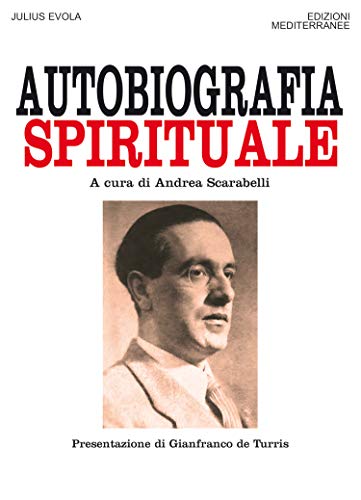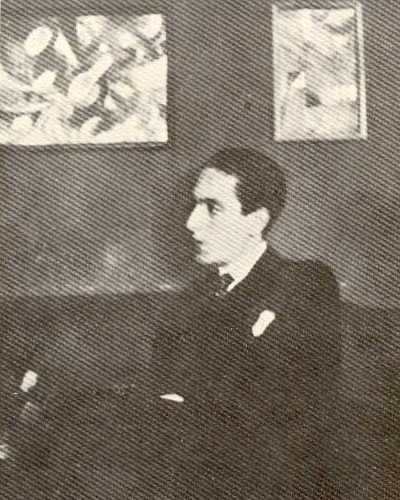The transcription of two long interviews released in 1969 and 1971, as well as three articles published in "Ur", integrate and complete the autobiographical picture of Julius Evola, which the Roman philosopher had already exhibited in his 1963 work "The path of cinnabar". In the texts collected here, Evola ranges with great ease from youthful readings to mathematics studies, from futurism to Dadaism, from his relations with Guénon to small portraits of famous people with whom he was in friendly relations, such as Marinetti and Ezra Pound.
di Luke Siniscalco
With the formidable curatorship of Andrea Scarabelli, a very precious booklet has recently been released to confront the traditionalist philosopher Julius Evola: Spiritual autobiography (Mediterranee, Rome 2019). The text, embellished with the preface by Gianfranco de Turris, President of the Julius Evola Foundation, contains the translation of two interviews, unpublished in Italy, that the author granted in 1969 and 1970 to a French television crew. Available in full on YouTube, but French in fact, the dialogue with Evola was carried out in two different moments: by Dominique de Roux, who on 19 July 1969 spoke with the "magical idealist" about his participation in the Dada movement and his relations with Ezra Pound, and by Jean-José Marchand, assisted by Marco Dolcetta, who interviewed him on October 18, 1971 on the evolution of his work in the different phases of the Via del Cinabro.
The document is then enriched by substantial apparatuses: three articles from the years 1927/1928, signed by Iagla and Ea, pseudonyms attributable to Evola himself and dating back to the experience of Magical association of Ur, the essays by the curator Andrea Scarabelli and the scholar Alessio de Giglio, as well as several color images taken from some sequences of the interview.

Spiritual autobiography it is a text intended for discussion. If, in some ways, the themes on which Evola is questioned by the interviewers can make the volume understood as a reduction of her spiritual autobiography, The path of cinnabar, the differences are significant. They depend, first of all, on the communicative modality of the interview, which it returns a more human Evola - Nietzschean way menschlich allzu menschlich -, at times ironic and pungent, and which, at the same time, induces him to launch into daring theoretical formulations, adequate, on certain themes, to throw a powerful interpretative light through which to profitably examine, with a renewed step, his entire work. For each of these plans, we will limit ourselves to just one example.
The first tells us about an Evola really out of the chorus, funny and politically incorrect; after claiming hers relational and erotic freedom ("You see, from a sexual point of view, I'm not for monogamy"), the "magical idealist" replies to those who accuse him, by virtue of his interest in tantrism and occultism, of celebrating black masses with young blond girls: «Given my current conditions [we recall that Evola was paralyzed, in a wheelchair], one would answer with these German words: To be too good to be true, "Too good to be true!"". A joke that nevertheless reveals the deep - and very serious - interest that Evola always turned to sex in its authentically supersensible dimension, that Metaphysics of sex which, summarized in the homonymous work of 1958, would always re-emerge in the essay and even pictorial production of ours.
The second reference, on the other hand, goes to a crystalline formulation of a metaphysical principle capable of illuminating a question that has haunted Evolian readers and exegetes from time immemorial. How to reconcile, in his work, the early writings, marked by a paroxysmal voluntarist, nihilistic and idealist subjectivism, with the works of maturity, inspired by the solar and absolute metaphysics of the forms and principles of the Thought of Tradition? In Spiritual autobiography Evola seems to make explicit an unspoken one that perhaps runs through his entire work, from Dada to Riding the tiger:
« There is no reality "behind" another reality at all, but there are different ways of experiencing one thing. […] If man changes his being, then he will perceive the itself reality in other forms. It's like a radio, you can push a button and tune into different wavelengths. Then she will perceive different channels. There is no relative world and absolute world, but one relative look it's one absolute look. »

The latter had however already been seen by Evola at least in 1927: in Experiences: the law of entities, one of the articles reported in the volume signed by Iagla, we speak of one "state of clarity or evidence", Who" no longer knows reasoning, concepts, doubts ", but only"needs deep, experienced, of knowledge, which is followed by the flash of direct evidence, an idea with the character of revelation, of absolute certainty, peremptory, striking ».
What is clarified is the doctrine of the two natures of Revolt against the modern world: being and becoming are not historical stages or external dimensions, but internal states whose realization is always possible in thehic and nunc. A philosophical foundation is thus offered to the work of inner transformation which alone can bring about renovation mundi and let the unmanifest appear. It is plastically realized in that domain of pure and elementary forms that Evola has outlined throughout his work, from the intuition of a "new classicism, freed from the ego, made up of action and the will of an" ever more real realism "" (Overcoming romanticism, in "Vita Nova", January / February 1931) to the discovery of a possible real "lived in a state in which there is no subject of experience nor object that is experienced, which is in the sense of absolute presence" (Riding the tiger, Scheiwiller, Milan 1971).
Because, after all, blond girls and absolute gaze are nothing but experiences on distinct levels of that reality one that never ceases to annoy us, postmodern men, with the strength of its intrinsic mystery.

2 comments on “Spiritual autobiography"